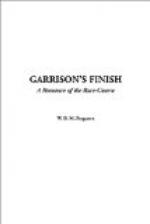Red had not gone back. He was young yet. But the first flush of his manhood had gone; the cream had been stolen. His nerve was just a little less than it had been; his eye and hand a little less steady; his judgment a little less sound; his initiative, daring, a little less paramount. And races have been won and lost, and will be won and lost, when that “little Less” is the deciding breath that tips the scale.
But he had no misgivings. Was he not the idol? Was he not up on Swallow, the favorite? Swallow, with the odds—two to one—on. He knew Garrison was to ride The Rogue. What did that matter? The Rogue was ten to one against. The Rogue was a fluke horse. Garrison was a has-been. The track says a has-been can never come back. Of course Garrison had been to the dogs during the past year—what down-and-out jockey has not gone there? And if Drake had transferred him to Desha, it was a case of good riddance. Drake was famous for his eccentric humor. But he was a sound judge of horse-flesh. No doubt he knew what a small chance Speedaway had against Swallow, and he had scratched advisedly; playing the Morgan entry instead.
In the grand stand sat three people wearing a blue and gold ribbon—the Desha colors. Occasionally they were reinforced by a big man, who circulated between them and the paddock. The latter was Jimmie Drake. The others were “Cottonton,” as the turfman called them. They were Major and Mrs. Calvert and Sue Desha.
Colonel Desha was not there. He was eating his heart out back home. The nerve he had been living on had suddenly snapped at the eleventh hour. He was denied watching the race he had paid so much in every way to enter. The doctors had forbidden his leaving. His heart could not stand the excitement; his constitution could not meet the long journey North. And so alone, propped up in bed, he waited; waited, counting off each minute; more excited, wrought up, than if he had been at the track.
It had been arranged that in the event of The Rogue winning, the good news should be telegraphed to the colonel the moment the gelding flashed past the judges’ stand. He had insisted on that and on his daughter being present. Some member of the family must be there to back The Rogue in his game fight. And so Sue, in company with the major and his wife, had gone.
She had taken little interest in the race. She knew what it meant, no one knew better than she, but somehow she had no room left for care to occupy. She was apathetic, listless; a striking contrast to the major and his wife, who could hardly repress their feelings. They knew what she would find at the Aqueduct track—find the world. She did not.
All she knew was that Drake, whom she liked for his rough, patent manhood, had very kindly offered the services of his jockey; a jockey whom he had faith in. Who that jockey was, she did not know, nor overmuch care. A greater sorrow had obliterated her racing passion; had even ridden roughshod over the fear of financial ruin. Her mind was numb.




